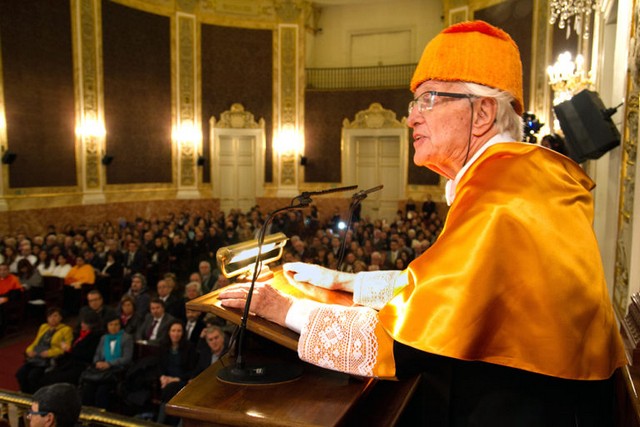By Antonio C. S. Rosa
The ‘Father of Peace Studies’ completes 90 years of age. At 24, he was jailed for 6 months as a Conscientious Objector in Norway. In jail he wrote, with Arne Næss, his first book: Gandhi’s Political Ethics. Today he has contributed more than 170 books; over 1500 papers, articles and book chapters; and over 500 Editorials for TRANSCEND Media Service on peace and conflict studies, mediation, and related issues.
Johan Vincent Galtung, dr, dr hc mult, a professor of peace studies, was born in Oslo, Norway on the same day that the UN would come to existence 15 years later. He is a mathematician–his first Ph.D.–, sociologist, political scientist and the founder of the academic disciplines of Peace and Conflict Studies. He founded the International Peace Research Institute, Oslo (1959), the world’s first academic research center focused on peace studies, as well as the influential Journal of Peace Research (1964). He has helped found dozens of other peace centers around the world since.
He has served as a professor for peace studies at universities all over the world, including Columbia (New York), Oslo, Berlin, Belgrade, Paris, Santiago de Chile, Buenos Aires, Cairo, Sichuan, Ritsumeikan (Japan), Princeton, Hawai’i, Tromsoe, Bern, Alicante (Spain), Islamic University of Malaysia in Kuala Lumpur, and dozens of others on all continents. He has taught thousands of individuals and motivated them to dedicate their lives to the promotion of peace and the satisfaction of basic human needs.
He has mediated in over 150 conflicts between states, nations, religions, civilizations, communities, and persons since 1957. His contributions to peace theory and practice include conceptualization of peace-building, conflict mediation, reconciliation, nonviolence, theory of structural violence, theorizing about negative vs. positive peace, peace education and peace journalism. Prof. Galtung’s unique imprint on the study of conflict and peace stems from a combination of systematic scientific inquiry and a Gandhian ethics of peaceful means and harmony.
“I have never been an advocate of world-saving narratives. The point about my work is to identify the neuralgic, specific contradiction in a specific place in space and at a specific moment in time and dissolve the contradiction with conflict transformation in order to prevent an escalation of whatever social contradiction one is dealing with into violence, whether direct or structural. To ask me whether I want to save the world is to have understood nothing about how conflict transformation works in practice. It’s like suggesting that a brain surgeon would want to extract a patient’s entire brain instead of working on the specific complication identified and localized in a specific region of the cerebral cortex. No, that is no way to proceed. One identifies concrete underlying contradictions in the social system at hand, then one identifies the causes, its drivers, and strives to undo the harm and hurt that could result from it by nonviolent means. I am not concerned with saving the world – I am concerned with finding solutions to specific conflicts before they become violent.”
Galtung was jailed in Norway for six months at age 24 as a Conscientious Objector to serving in the military, after having done 12 months of civilian service, the same time as those doing military service. He agreed to serve an extra 6 months if he could work for peace, but that was refused. In jail he wrote his first book, Gandhi’s Political Ethics, together with his mentor, Arne Næss. This event would trigger a world-changing lifetime work for peace: 170 books, plus.
In 2008, along with editor Antonio C. S. Rosa, he founded the pioneering TRANSCEND Media Service-TMS website, which features Solutions-Oriented Peace Journalism and for which he writes editorials.
He is founder (in 2000) and rector of the TRANSCEND Peace University, the world’s first online Peace Studies University. He also founded in 1993 TRANSCEND International, a global nonprofit network for Peace, Development and the Environment, with over 500 members in more than 70 countries around the world. As a testimony to his legacy, peace studies are now taught and researched at universities across the globe and contribute to peacemaking efforts in conflicts around the world. In 2008, he founded the TRANSCEND University Press.
Johan Galtung has conducted a great deal of research in many fields and made original contributions not only to peace studies but also, among others, human rights, basic needs, development strategies, a world economy that sustains life, macro-history, theory of civilizations, federalism, globalization, theory of discourse, social pathologies, deep culture, peace and religions, social science methodology, sociology, ecology, future studies.
As a recipient of over a dozen honorary doctorates and professorships and many other distinctions, including a Right Livelihood Award (also known as Alternative Nobel Peace Prize), Johan Galtung remains committed to the study and promotion of peace.
Galtung has mediated in over 150 conflicts in more than 150 countries, and written more than 170 books on peace and related issues, 96 as the only author. More than 40 have been translated to other languages, including 50 Years-100 Peace and Conflict Perspectives published by TRANSCEND University Press. Transcend and Transform was translated to 25 languages. He has published more than 1500 articles and book chapters and over 500 Editorials for TRANSCEND Media Service. More information about Prof. Galtung and all of his publications can be found at transcend.org/galtung.
Antonio C. S. Rosa (on the right of Johan Galtung in the photo), born 1946, is founder-editor of the pioneering Peace Journalism website, TRANSCEND Media Service-TMS (from 2008) under Galtung’s inspiration and guidance.
19 October 2020
Source: www.transcend.org

